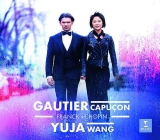 César Franck: Violinsonate A-Dur (arr. für Cello & Klavier); Frédéric Chopin: Cellosonate op. 65 + Introduction & Polonaise brillante op. 3; Astor Piazzolla: Grand Tango; Gautier Capucon, Cello, Yuja Wang Klavier; 1 CD Erato 0190295392260; Aufnahme 04/2019, Veröffentlichung 12/2019 (79'09) - Rezension von Remy Franck
César Franck: Violinsonate A-Dur (arr. für Cello & Klavier); Frédéric Chopin: Cellosonate op. 65 + Introduction & Polonaise brillante op. 3; Astor Piazzolla: Grand Tango; Gautier Capucon, Cello, Yuja Wang Klavier; 1 CD Erato 0190295392260; Aufnahme 04/2019, Veröffentlichung 12/2019 (79'09) - Rezension von Remy Franck
Selten hat mich eine CD so perplex gelassen wie diese hier, weil ich den Eindruck nicht los wurde, dass die beiden Musiker, die hier zusammenspielen, eigentlich nicht zusammen passen. Andererseits passiert so viel, dass ich verstehen würde, wenn jemand begeistert reagiert, während ich mich eher enerviert fühle.
Zunächst versuchte ich es mit Lautstärkeeinstellungen, denn das dominierende Klavier kann schon ziemlich dröhnen. Doch das änderte nicht viel, und es ist auch nicht so, dass der Klavierklang das Cello erdrücken würde. Aber die Wang bringt so viele Noten zu Gehör, dass man ihr mehr zuhört als Capuçon. Und so ist das ganze Programm eigentlich mehr auf Kontrast denn auf harmonierenden Zusammenklang angelegt. Gewiss, Capuçon kann auch ganz schön hinlangen und sehr intensiv spielen, aber wo er lyrisch singt, spielt Wang eher perkussiv. Die von Jules Delsar für Cello und Klavier arrangierte Violinsonate von César Franck wird so zu einer ganz neuen Erfahrung. Ich gebe ehrlich zu, dass mir diese Interpretation nicht gefällt.
Ebenso kontrastreich ist die Darbietung von Chopins Cellosonate in g-Moll. Und hier fehlt mir noch mehr als bei Franck die Seele und insbesondere die dem Stück inhärente Melancholie.
Chopins Polonaise brillante und Astor Piazzollas Grand Tango brauchen die Tiefe nicht, die bei Franck und Chopin nötig ist, und so könnte ich mich in diesen beiden Stücken noch am ehesten an dem Kontrast-Duo Wang-Capuçon erfreuen. Aber aufs Ganze gesehen, war ich, so perplex mich die CD anfangs ließ, am Ende doch froh, als das Programm zu Ende war. Froh und enerviert.
Rarely has a CD left me so perplexed as this one, because I constantly had the impression that the two musicians don’t really form a harmonious duo. On the other hand, so much is happening in the music, that a more positive reaction is quite understandable, while I feel rather enervated. At first I tried to lower the volume, because the dominant piano can be pretty booming. But that didn’t change much, and it’s not like the piano sound would crush the cello. But Wang’s extremely rich and clear playing is getting simply more attention than Capuçon. And so the whole program is actually more about contrast than harmony. Of course, Capuçon can also play very intensively, but where his playing is lyrical, Wang’s is percussive.
César Franck’ Violin Sonata, arranged by Jules Delsar for cello and piano, thus becomes a completely new experience. I honestly admit that I don’t like it.
Equally rich in contrast is the performance of Chopin’s Cello Sonata in G minor. Yet it is lacking soul and especially the melancholy of this piece.
Chopin’s Polonaise brillante and Astor Piazzolla’s Grand Tango do not need the depth required by Franck and Chopin, and so, in these two pieces, I enjoyed the duo Wang-Capuçon. But on the whole, as perplexed as the CD left me in the beginning, I was happy when the program was over. Happy and enervated.






















